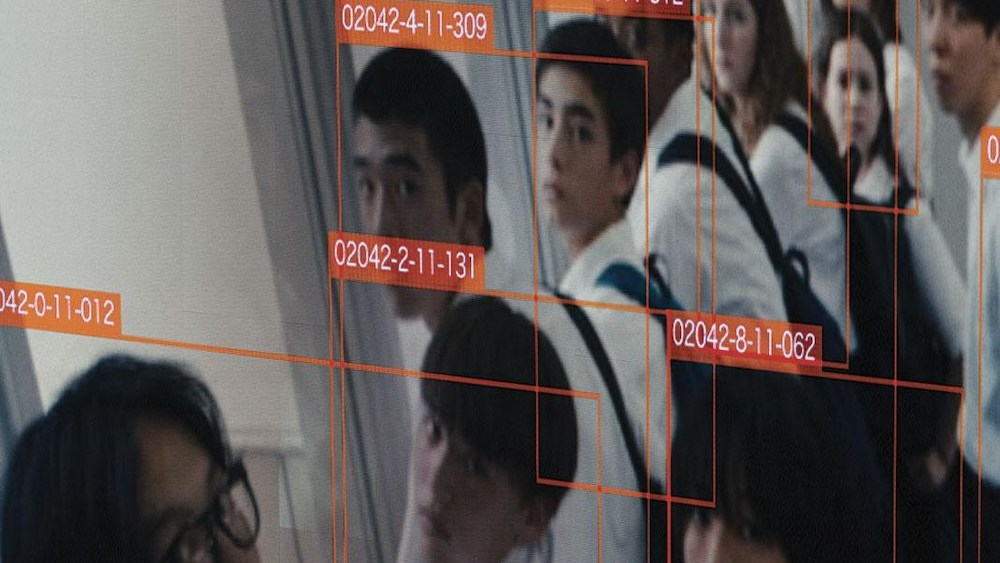A Coolly Poignant Surveillance-Era Allegory
Japanese director Neo Sora is no catastrophist: the vision of dystopia he puts forth in his coolly compelling first fiction feature “Happyend” is chilling precisely because it won’t take some thunderous armageddon to bring it about. Instead, in a near future that’s barely a stone’s throw from now, beset by many of our present predicaments and a sense of impending but not quite imminent apocalypse, his teenage heroes come of age as kids have always done. It’s just that here, there is the added poignancy of experiencing the end of the beginning of life amid what might just be the beginning of the end of the world.
In tomorrow’s Tokyo, where the concrete curves and high-rise skylines have a slightly denatured air (perhaps because the film was largely shot in Kobe) a high-school principal (Shiro Sano) is distressed to discover his beloved sports car has overnight been set on its rear bumper, and now stands like a splashy yellow monolith in middle of the gray school courtyard. Students gape at it in wonder — slap Banksy’s name on it and you could call it art — but this juvenile prank, revealed to us in one of DP Bill Kerstein’s graceful, self-possessed tracking shots, is swiftly declared an act of “terrorism” and becomes the pretext for the installation of a draconian surveillance system.
The whole student body are thus to be punished for the actions of just a few. As to who the few might be, suspicion immediately falls — and not without good reason — on a gang of genially rowdy final-year teens, whose ringleaders Kou (Yukito Hidaki) and Yuta (Hayao Kurihara) have been best friends since childhood. Along with Tomu (Arazi), Ming (Shina Peng) and Ata-chan (Yuta Hayashi) they form a tight-knit crew who share a love of underground music, and revel in the comparative freedom offered by the school’s equipment-stuffed music room, which they regard as their rightful territory and base of operations.
As befits the son of the late Ryuichi Sakamoto (and director of acclaimed documentary “Ryuichi Sakamoto: Opus”) Sora displays a subtly fervent faith in music as perhaps the ultimate expression of nascent individuality, and therefore, ever and eternally, a threat to regimes that rely on conformity and obedience. Early on, Kou and Yuta gatecrash a techno club (using the tried-and-tested analog method of sneaking in the back) only for the place to be raided by the police. Afterwards, in the confusion, the DJ they idolize slips the boys the rest of his set on a thumb drive, and it’s like he’s entrusting to them the duty of keeping the thumping beat of youth-culture resistance alive.
That’s a project that doesn’t much interest privileged rebel-without-a-cause Yuta as, under the ebbs and swells of Lia Ouyang Rusli’s superb score — monumental electro one moment, softest piano the next, never overbearingly deployed — Sora gradually narrows the focus of his own all-seeing-eye onto the bond between him and the more thoughtful Kou. Coming from a family of undocumented immigrant Koreans, Kou has a lot more to lose from any run-ins with the authorities than his cosseted BFF, but it’s not just the difference in their social status that begins to tease them apart. Kou also develops a crush on Fumi (Inori Kilala), a quiet, studious girl in his year (“You read books on paper?” he asks her incredulously) who hangs with an activist group that knows how to channel youthful disaffection into actual political protest. Kou gets involved and enjoys an awakening while Yuta., the more obviously rebellious kid proves ultimately to be the more timid. Everyone’s changing and Yuta secretly longs for things to stay the same.
This is a very near future, so little explanation is needed of so-far uninvented tech or unfamiliar language and customs. Instead, Sora’s clean-lined screenplay sketches a world that looks a lot like ours, only with the screws a little tightened. Cellphones are ubiquitous, but used as tracking devices; faces are as fingerprints, and once snapped by a passing cop, all your details appear at the tap of a touchscreen. But he also offsets the techno-paranoid doom-and-gloom by crisply noting the heartening irony that the very tech that dictatorial regimes will lever to suppress youthful exuberance will always be better understood by the youth than by their aging oppressors. No matter the bouncers, the underage will always find a back door through which to sneak. This underlying faith that the kids are gonna be alright, as well as a sweet, simple sadness for the people we lose on the way to becoming the people we’re going to be, means there’s a certain naiveté to “Happyend.” But maybe naive is exactly what we need, when you consider what all this sophistication has done for us.


